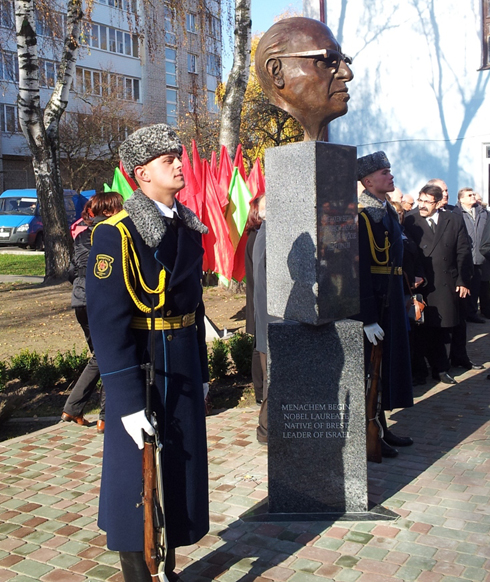One hundred years after he was born in the Belarusian city of Brest, Menachem Begin, the sixth prime minister of Israel, was commemorated with a memorial in the city center last week.
A day earlier, the Belarusian mail service launched a set of stamps with portraits of Zionist leaders born in the country. Among the Israeli leaders born in Belarus were Prime Ministers Begin and Shamir, Presidents Weizmann, Zalman Shazar, and Shimon Peres.
Related stories:
- Poll: Anti-Semitism on rise in Europe
- Kristallnacht remembered, memory fades
- Op-ed: Rethinking European Jewry
The statue was erected in the square next to the Jewish school that Begin attended as a child, and behind the main synagogue of Brest's Jewish community which was transformed during the Communist years into a movie theater. Hundreds of Jews were rounded up in the square by the Nazis before they were led to their execution site on the river Bug.
As a child, Begin was twice forced to leave the city. Once during World War I, when the residents of the city were exiled, and again with the outbreak of World War II, when he served as the Betar representative to Poland, aiding students escape Europe and attempt immigration to Israel. His parents were murdered by the Nazis. His father was shot with 500 of the city's Jews on the bank of the river Bug, while his mother found shelter at a hospital run by a family friend, but was executed with the rest of the patients when Nazis discovered them. After the Holocaust, only seven people, out of some 33,000 Jews in Brest, had escaped the Nazi genocide.
Now the story comes full circle, as Belarusian soldiers stand an honor guard for the unveiling of Begin's statue. Others laid flowers in the national colors of Belarus – red and green.
"Events such as these strengthen the community," said the head of the Jewish community in Brest, Regina Simonenko. "This is a feeling of recognition of the importance of the Jewish community, the importance of the Jewish emigrants, and the mark they stamped on Israel and the contact between the two countries."
In a conversation with Ynet, Simonenko added that unofficial figures estimate the number of the city's Jewish residents between 1,000 and 1,500. The community is on good terms with the authorities, and there are few incidents of anti-Semitism. "It is related to the socio-economic situation, and in this area the financial situation is normal," she said. The Israeli ambassador to Belarus, Joseph Segal, concurred: "There is almost no anti-Semitism in this country. In the two years that I've been here, I heard two cases of Jewish cemeteries being desecrated, and in both cases there was a swift response by the authorities."
According to the ambassador, the Belarusian authorities are fans of Israel, and the erection of the Begin monument is a symbol of such. "The door of the authorities is always open to the ambassador," said Segal, "But I didn't believe that we would succeed in erecting this monument. I worked on this from the day I started this position. There was no precedence for this, because on the political level it requires the approval of President Alexander Lukashenko himself."
City square symbolism
The elite of Brest took part in the ceremony, including the heads of the Jewish community in the city and on a national level, and the staff of the Israeli embassy – as well as Herzl Makov, the head of the Menachem Begin Heritage Center.
"From our perspective, the target audience for this type of commemoration is not the local residents, definitely not the non-Jewish community," said Makov. "What is important is the symbolism – specifically in a place which for many years ignored the man, Zionism and the State, they are expressing appreciation for Begin and his action. It has more importance than in another place. Part of the symbolism in this commemoration, in the city square, is the fact the Jewish community of Brest was annihilated. The Jewish activity in place today is a pale shadow of its former prosperity and power. Begin himself was very influenced by the destruction of European Jewry and a major part of his outlook was molded by it."
Makov was the only person during this week's events to mention that the relations between the two nations had seen darker times. Begin used to say:" I will never return to Brest, but Brest will forever be with me."
- Receive Ynetnews updates
directly to your desktop

















